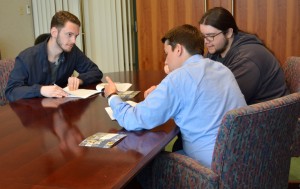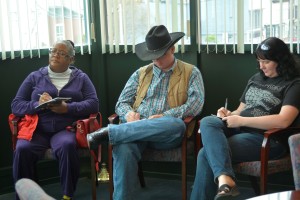On Friday, April 8, instructors and students from the History Club at Hopkinsville Community College visited the Thomas D. Clark Center for Kentucky History. As part of their experience on the KHS campus, club members became the first group to play out the classroom simulation of The Caroline Chronicles. And we’re thrilled to report that they—and the simulation itself—outperformed even our wildest expectations.
The simulation involves two sides—a defense counsel and a prosecution team—arguing for and against Caroline’s pardon using evidence drawn directly from the primary, secondary, and legal documents used to pen the blog series. The decision-makers in the case are a panel of Pardon Commissioners, who listen to verbal arguments from both the prosecution and the defense, are allowed to question the lead counsels of each side, and then issue a recommendation to the governor. (To ensure fair proceedings, all participants were given access to all of the documents prior to the simulation and then divided into roles randomly before the trial began.) After deliberating privately, Pardon Commissioners must report their recommendation to the rest of the group and offer three justifications based only on the arguments and evidence presented by counsels.

The prosecution at work.
With Jack McCoy-like gusto, the prosecution offered its arguments first, making a strong case for upholding Caroline’s conviction (listed below):
- Caroline believed she should have become a free citizen after arriving in Louisville as contraband with Buell’s army. Her service in the Willis Levy house constituted re-enslavement and gave her a strong motive to lash out at her new master’s family.
- On a personal level, Willis and Anne Levy had been abusive of Caroline, treating her cruelly, scolding her frequently, and even threatening physical punishment. Aside from her enslavement, this hostility also gave Caroline ample motive to punish Willis and Anne by hurting their only child.
- Not only did Caroline have the means to commit the crime—she had easy access to the poison that killed Blanch Levy—she was also seen smiling at the toddler’s corpse on more than one occasion and asked several times when the corpse would be buried. According to the prosecution, this indicated that Caroline was happy to see Blanch dead but also wanted the evidence of her crime buried before an autopsy could expose her guilt.
Following the prosecution’s oral arguments, the Pardon Commissioners threw a potential curve ball; they asked if it was possible that Anne Levy had actually tried to poison her daughter and herself as part of a murder-suicide plot (potentially rooted in lingering post-partum depression). The prosecution quickly replied that no evidence whatsoever existed to support such a conclusion.

The defense organizing its case.
Caroline’s defense counsel then took the floor and gave three core arguments in favor of reasonable doubt existing:
- Just as much of the evidence collected points to Willis Levy having accidentally poisoned Blanch as it does Caroline as the killer—and while this doesn’t totally negate any possibility of Caroline’s guilt, it does raise a reasonable doubt.
- Next the defense focused on the victim. Blanch Levy was a toddler; toddlers put things—everything—in their mouths. It’s very possible that Caroline was watching Blanch in the yard and that Blanch picked up poison put out by Willis Levy, and ingested the poison accidentally. In other words, the defense added a layer of complexity to the accidental death scenario in which Caroline was not criminally at fault.
- Lastly, the defense pointed to the consistency of Caroline’s story in the case record. Throughout the entire process, even following her conviction, Caroline never changed her narrative of Blanch Levy’s death—and in keeping with her purported affection for the child, the defense underscored that Caroline’s smiling at the corpse and her questions about the autopsy could have just as easily stemmed from genuine concern and her traditional role as a female slave on the plantation (tasked with the “work of death”).
The Pardon Commissioners did not have any questions for the defense and subsequently left the courtroom to confer in private chambers.

The panel of Pardon Commissioners listening to verbal arguments.
The panel of Pardon Commissioners returned to the courtroom and recommended that Caroline be issued a full pardon by the governor. Their reasoning included that (1) Willis Levy had a track record of carelessly using poison in the general vicinity in which Blanch was killed; (2) the prosecution had failed to properly establish a motive for Caroline to kill Blanch; and, (3) the Pardon Commissioners believed that Caroline did have genuine affection for Blanch and, as a result, that she would have lashed out at Willis and Anne Levy to protest her treatment while not harming the child.
The Pardon Commissioners’ recommendation aligned with the historical results of Caroline’s case; in turn, she was awarded a full pardon. So now the question is: how do you think your class would decide?
If you’re interested in finding out, drop us a line about adopting The Caroline Chronicles curriculum in your classroom. Included are primary and secondary reading assignments, low and high stakes writing assignments with instructor guidelines, and the script for the capstone in-class trial simulation.
